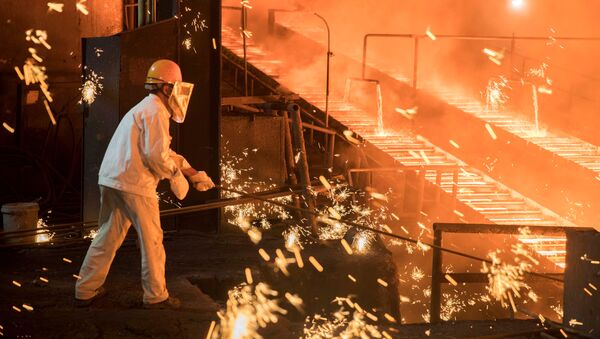Rare earth metals are a group of 17 chemical elements. They are indispensable for the manufacturing of screens for smartphones, motherboards, and other complex electronics. They are used in the production of modern construction materials, optics, nuclear engineering, mechanical engineering, petrochemistry, i.e. in almost all high-tech fields.
China is the world's main producer of rare-earth metals. Most of the world's reserves of this raw material are concentrated in its grounds. Since the early 2000s, China has been actively developing the rare-earth processing industry. This was a logical decision, as China has been a world factory for many decades, where, for example, most of the electronics are produced.
As a result, even those rare-earth elements that are mined in the Mountain Pass Mine in California, for example, are sent for processing to China. China currently controls over 90% of the rare earth market, which is estimated at $4 billion. This situation has begun to worry Washington: what if, as a result of a trade conflict, China decides to restrict or stop exporting rare earth metals entirely?
Then how do we produce the same military equipment? Eventually, the Trump administration announced that it will look for alternative suppliers of rare-earth metals in other countries, including Australia and Malaysia, and will develop its production and processing of these raw materials, at least to meet military needs.
Contrary to these concerns, however, China did not reduce the production of rare-earth metals but instead expanded its quotas. The use of rare-earth metals as leverage against other countries would hit the image of China and lead to the transformation of global supply chains, which is not beneficial to Beijing, Wang Yiwei, a professor at the School of International Studies at Renmin University, told Sputnik:
“If China used rare-earth metals as a bargaining chip, it would be detrimental to China and the rest of the world, as it would ruin China's international image”, the expert said.
According to the professor, in the end, most of the electronics that use in its production rare-earth metals are manufactured in China:
“China would hardly refuse to participate in global supply chains just to use rare elements as a trump card in a trade war. Although many analysts have argued that China can use this leverage, I think it is more of a warning to the US”, he stressed expressing hope that Washington will be sensible about this problem and will not start a global supply chain war that could plunge the world into chaos.
The expert also pointed out that rare-earth metal reserves were not limited to China. These resources are found in Australia, Mongolia, Japan, and, after all, in the US itself. Therefore, restricting the production and export of these metals would only lead to China losing its leading position in this market, and its place would be taken by alternative suppliers.
On the contrary, the expansion of production is much more efficient. With the increase in market supply, this resource price falls. Under such conditions, it is becoming less profitable to invest in new production facilities, as the US is trying to do now. Therefore, this step of China, on the contrary, strengthens its position the world of rare earth metals supply. Furthermore, expanding output of this resource meets China's internal needs, Wang Yiwei noted.
"The United States and Japan have already begun to develop rare-earth deposits in Australia. The US fears that although there will be no direct military confrontation with China, the confrontation in industrial areas has already begun. This is especially true for high technologies. Therefore, the US is trying to prepare for the confrontation with China in the long run," he said.
However, according to the expert, China is now increasing the production of these resources because it has already outgrown the confrontation with the US and takes into account the problems of global supply chains. Therefore, China is strengthening the development of this industry so that it can meet its own needs, including the needs of the Industry 4.0 project.
Rare-earth metals are the key raw material for the development of all these industries. Logically, China will continue to strive to maintain its global leadership in the extraction and processing of this valuable resource.


